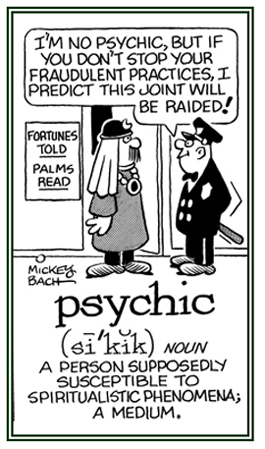psych-, psycho-, -psyche, -psychic, -psychical, -psychically
(Greek: mind, spirit, consciousness; mental processes; the human soul; breath of life; literally, "that which breathes" or "breathing")
A prefix that is normally used with elements of Greek origin, psych- affects the meanings of hundreds of words.
Etymologically, this element includes such meanings as, breath, to breathe, life, soul, spirit, mind, consciousness.
2. Pertaining to or within the purview of psychiatry.
2. The study of the origin, influence, and control of emotions. This involves investigating the factors both from within and without that alter emotions and motivation. Such analysis provides a basis for judging regression or progression.
3. The medical specialty concerned with the diagnosis and treatment of mental disorders.
2. Etymology: from Greek psychikos, "of the soul, spirit, or mind" from psyche, "soul, mind."

Go to this Word A Day Revisited Index
so you can see more of Mickey Bach's cartoons.
According to a psychoacoustician, most people perceive airplane noise as if it were 10 dB greater than a similar noise that is made by a train, or ten times noisier than a train even when the noise levels of both are objectively the same.
While working in the mental health unit at the hospital, Dr. Kitchen observed patients when different kinds of music was played, hoping to write a scientific paper on psychoacoustics for a professional journal.
2. A discipline combining experimental psychology and physics that deals with the physical features of sound as related to audition, as well as with the physiology and psychology of sound receptor processes: The local university's psychology and physiology departments were the primary organizers of an international convention that was being planned in the city for scientists and practitioners of psychoacoustics."3. The scientific investigation of the way in which animals and humans hear, particularly the reception and analysis of the input signals: Dr. Laurie specialized in psychoacoustics, studying the relationship that existed between sound receptions and the biological processing of sounds.
Some medicines or drugs possess psychoactive abilities to alter mood, anxiety, behavior, cognitive processes, or mental tension.
2. A sensitivity to emotionally charged symbols.


